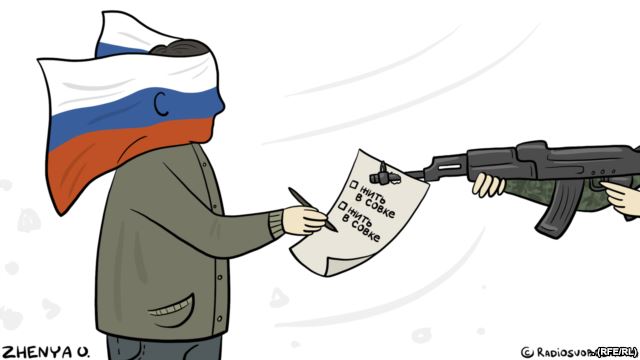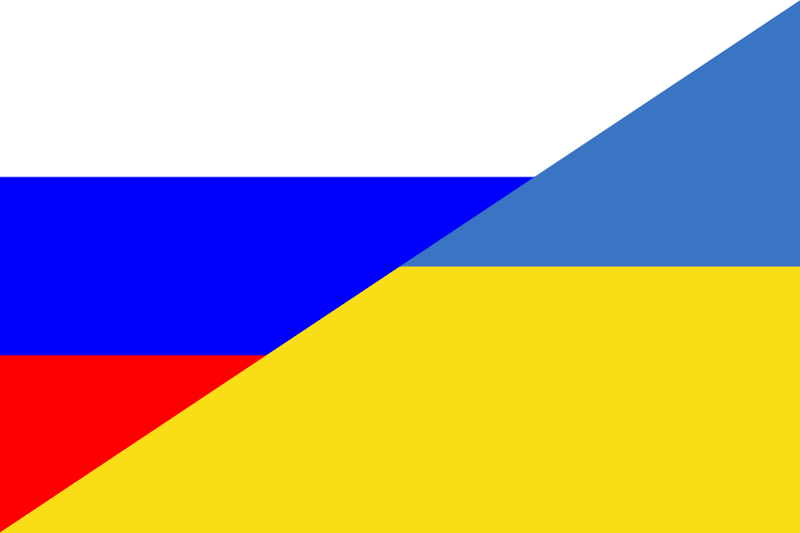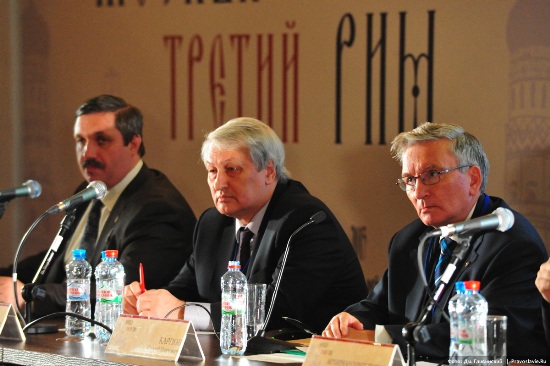Acting head of the Republic of Crimea (read: the head of the Russian occupational government of the annexed region) Sergey Aksionov stated recently: “In case Scotland’s referendum is acknowledged, it will mean that Crimea should be acknowledged by EU countries automatically without any questions or doubts. I am curious as to how representatives of European governments will behave in comparison to us. Will they also impose sanctions on Scotland, shoot at them or advance with tanks?”
How much is the Scottish situation similar to the Crimean one?
At a close examination, one can see that there are few similarities. In reality, they are exhausted only by the nature of the situation: part of the population of a region which is part of some state doesn’t want to remain there. That is all. This is where the differences start.
First, even those Scotts who dream of the cessation of their Motherland from Great Britain do not want to join any other third state, meanwhile Crimea, as a result of the events in March, was, as is known, declared part of Russia.
Second, the choice given to the Scotts at the referendum is crystal clear: are you for the independency of Scotland or for the preservation of its current status, a country which is part of the United Kingdom, next to England, Wales and Northern Ireland? In Crimea the options were different: accession to the Russian Federation as a subject, or the reinstatement of the 1992 Constitution (with a broad autonomy) with the formal preservation of the peninsula within Ukraine. As opposed to Scottish citizens, the residents of Crimea were not given the option of ‘leaving everything as it is’ (so retain the current Constitution of 1998). There was no option for independence either.
Meanwhile, similar precedents can be found. As such, in 1935 the citizens of Saar, a small territory at the border between Germany and France, decided at a plebiscite, which was held by the League of Nations, to which country they wanted to accede. However, there was a third option: retain Saar as a territory subject to international governance, which it has been for 17 years after World War I.
Third, the Scottish referendum is being held after long talks between Edinburg and London, with the consent of both parties that decided to find out the opinion of the citizens of Scotland in the issue of the country’s independence. It goes without saying that in March the Crimean ‘referendum’ was never accorded with Ukraine.
Fourth, the voting in Scotland was preceded by a campaign of many months, in which both the supporters and those who were against independence had numerous opportunities to freely express their opinion. First Minister of Scotland, leader of the nationalists Alex Salmond and former Minister of Finance Alistair Darling, who is head of the civil campaign for British unity Better Together, held TV debates that were broadcast on Scottish television. The voting in Crimea, in contrast, was organized within days, and those who were against joining Russia were not only suppressed: they were subject to intimidation and prosecution.
Fifth, on the territory of Scotland, as opposed to Crimea, during the referendum there are not armed ‘polite men,’ who came from a neighboring country. In reality, if we judge from international practice, only this circumstance is enough to not consider the voting in Crimea democratic and not compare it to the Scottish one.
In any case, the Scottish referendum, regardless of the result, will become an important precedent for Europe. Spain is awaiting its results with great anticipation. As their very own referendum for independence is schedule for November in Cataluña, one of the autonomous regions in this country. However, Madrid does not acknowledge the Catalan voting, stating that the Spanish Constitution does not allow the regions to leave the country. It is so far unclear how this conflict will end, but it is easy to assume that a victory on part of the supporters of Scotland’s independence will encourage Catalan nationalists and give them confidence to go till the end in contradiction to Madrid.
As to the Scottish, for them the socio-economic arguments so far took precedence over the solely nationalist, psychological and historical ones. The majority of Scottish voters traditionally vote for the Labour Party and other left-wing parties. The perception this majority has to social policies and financial priorities has long been very different from the neo-libertarian course which the British coalition government is carrying out together with David Cameron, and partially with his predecessors, the ‘new Labourists’ Tony Blair and Gordon Brown. This is why the major part of the discussion on independence is concentrated on the issue of economic stakes, and not the advantages the kilt has over trousers or memories of the Bannokburn battle in 1314, when the Scottish army defeated the army of the English King. However, the date of the referendum was set for the 700th anniversary of this battle, which way back when gave independence to Medieval Scotland, which, naturally, has symbolic significance.
Judging from everything, it will be no catastrophe neither for Scotland nor Britain, even if the majority of voters at the referendum vote for independence. However, there will be difficulties. Say, what to do with the base of autonomous submarines and other military objects of the United Kingdom based in Scotland? The construction of a new haven to the south of the newly created border with cost London a lot of money. On the other hand, economically, it seems that Scotland will suffer the most in the beginning: the local exporters will have a hard time, having lost the British market. The change of currency will cause many problems as well: London already made it clear that Edinburg can kiss the British pound goodbye should they vote for independence. What should Scotland do next: start their own currency? Possibly join the Euro zone? However, this is also very difficult, as the very membership of an independent state of Scotland in the European Union is doubtful.
The issue is that in order to become part of the EU, any country needs support from all 28 members of the alliance. Will Britain give the green light for its former Great British partner to join the European Union? Or will it leave the EU itself, as talk of referendum on this issue has become louder and louder in Britain? Will Scotland’s cessation not start a bad British internal policy crisis?
For politicians and, possibly, all citizens of Great Britain, it is possible that the best out come would be the victory of those who are against independence with a small advantage, say, 52 to 48. David Cameron could then claim that common sense had won and his government ‘saved the unity of Britain.’ Alex Salmond and his associates, on their part, could claim that they fought for the independence of Scotland like lions and lost in a dignified manner, after which they could be completely grounded in their demands that London further broaden Scottish autonomy and provide other preferences. Possibly, Elizabeth II would heave a sigh of relief with such a result. However, according to polls, the majority of the Scotts would want to preserve the monarchy even if they do get independence, the role of the crown in the political system of the new state would be determined by the new constitutions, and there could be problems with royal property in Scotland as well…
In the end, the Scottish are the ones who will make the choice. However, it seems so far that their ‘yes’ to cessation from Britain will give little reason for happiness to the rest of the world. The team would be kind of strange: Catalan nationalists, Sean Connery, Sergey Aksionov and the rock band Franz Ferdinand, which came to Edinburg with a concert in support of Scottish independence.








